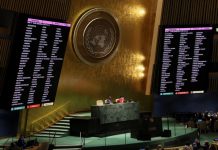On September 15, 2020, the Abraham Accords Peace Agreement: Treaty of Peace, DiplomaticRelations and Full Normalization Between the United Arab Emirates and the State of Israel wassigned at the White House formally normalizing UAE and Israel relationships. Prior to thistreaty, the UAE, along with most Arab nations and Muslim majority countries, did not recognizeIsrael’s sovereignty and had zero diplomatic or economic relations with them (Holland, 2020).The Gulf state is only the third Arab nation to establish diplomatic ties with Israel, after Egyptand Jordan, both of whom share a border with Israel.
The Abraham Accord, which is the treaty signed, includes military cooperation, recognizing each state’s sovereignty, engaging in various bilateral agreements, establishing telephone links between the two countries that were blocked before, and direct commercial flights between Tel Aviv and Abu Dhabi (Egozi 2019).
This deal drew lots of criticism and back-lash from Muslim states, including Iranian leadership accusing the UAE of stabbing Muslims in the back, and the Pakistani prime minister, who stated that Pakistan will not normalize any ties with the Jewish state until there is a two-state solution to the Israel-Palestinian conflict, to which the Palestinians agree. Palestinian president Mahmoud Abbas opposed the deal, stating that it was “a betrayal of Jerusalem, Al-Aqsa (an important mosque in Islam) and the Palestinian cause” (Holland 2020). Palestinian leadership also claims that they were not aware of this deal taking place, and were completely blind sided by it. The Palestinian public showed their anger towards the UAE by holding public protests and burning the UAE flag.
The UAE, however, justified this deal by arguing they signed it partly because Israel froze their plans to annex parts of the West Bank, which were part of a U.S. peace plan revealed in January. Despite signing the deal, the UAE still claims to be a supporter of the Palestinian people, and says it believes in a two-state solution. Nonetheless, Israeli prime minister Netanyahu made it clear that this suspension is only temporary and Israel will proceed with the original annexation plan.
Some advantages that the UAE will enjoy from signing this deal include it being easier for them to buy F-35 fighter jets from the US, which will give them an edge over all militaries in the region, except Israel. Moreover, they now have the option of buying Israeli products, such as military technology and other high technology items, in addition to collaboration in other sectors such as health and tourism, which will be mutually beneficial for the two states.
This move by the Emiratis shows a major fracture in the pan-Arab solidarity against Israel. Shortly after the UAE and Israel agreement, another Arab state, Bahrain, also joined the UAE in signing a diplomatic relationship treaty with Israel. Even though the UAE-Israel deal is bilateral, it has major implications on the rest of the Arab world, particularly Palestine.









